May 1509-1519 Coronation of Henry VIII and Marriage to Catherine of Aragon
May 1509-1519 Coronation of Henry VIII and Marriage to Catherine of Aragon is in 16th Century Events.
2nd Millennium, 16th Century Events, May 1509-1519 Coronation of Henry VIII and Marriage to Catherine of Aragon, Marriage of King Henry VIII and Catherine of Aragon
Letters and Papers 1509. 07 Jun 1509. 60. [147.] Catharine of Aragon.
Renunciation by Catharine, in favour of Henry VIII, of her dowry of 200,000cr. (of 4s. 2d.) stipulated by the treaty of 3 June 1503. Greenwich, 7 June 1509.
Lat. Copy. See No. 65 iv.
R. O. Rym., XIII. 261.
Letters and Papers 1509. 11 Jun 1509. 41. Catharine of Aragon. Acknowledgment by Henry VIII (age 17). of receipt from Gutierre Gomez de Fuen Salida, comendator of La Membrilla, ambassador of Ferdinand King of Aragon, &c., of 50,000 crowns of gold, in part payment of 100,000 crowns for dowry of Catharine Queen of England (age 23). S.B. Undated (now filed with 11 June). [162.]

On 11 Jun 1509, one month after the death of his father, Henry VIII (age 17) and Catherine of Aragon (age 23) were married at the Church of the Observant Friars, Greenwich [Map]. She had, eight years before, married his older brother Prince Arthur Tudor - see Marriage of Arthur Tudor and Catherine of Aragon. She the daughter of Ferdinand II King Aragon (age 57) and Isabella Queen Castile. He the son of King Henry VII of England and Ireland and Elizabeth York Queen Consort England. They were half third cousin once removed. She a great x 3 granddaughter of King Edward III of England. 

Wriothesley's Chronicle 1485-1509. 03 Jun 1509. And in June followinge the King was married to Queene Katherin, late wife of his brotherh Prince Arthure,

Note h. At Greenwich, on Trinity Sunday, June the 3rd.[Note. Other sources say at 11 Jun 1509?]
2nd Millennium, 16th Century Events, May 1509-1519 Coronation of Henry VIII and Marriage to Catherine of Aragon, Coronation of Henry VIII and Catherine of Aragon
Letters and Papers 1509. 11 Jun 1509. 43. The Coronation. Commission to Thomas Earl of Surrey (age 66), High Treasurer, George Earl of Shrewsbury (age 41), Steward of the Household, Sir John Fyneux (age 68), Chief Justice of the King's Bench, and Sir Th. Inglefield, to hear, in the White Hall within Westminster Palace, petitions of the King's tenants and others claiming to perform special services at the approaching coronation. Del. Westm., 11 June, 1 Henry VIII. S.B. (countersigned: Ri. Wynton, C. Somerset, Thomas Lovell.) [164.]

Letters and Papers 1509. 11 Jun 1509 and 23 Jun 1509. Tib. E. VIII. f. 100b. B.M. 81. Preparations For The Coronation.
A "device for the manner and order of the Coronation" of Henry VIII, "rightful and undoubted inheritor of the crowns of England and of France," by the whole consent of the realm chosen and required to be King, and also of the Princess Catharine daughter of Spain and Aragonne, his wife, Queen of England and of France, to be solemnised at Westminster, on Sunday, 24 June, 1509.
The King has proclaimed that all who claim to do services on Coronation day shall be in the White Hall at Westminster Palace, 20 June next, and has authorised the Earl of Surrey (age 66), Treasurer of England, the Earl of Oxford (age 9), Sir John Fyneux, Chief Judge, Sir Thomas Englefeld, and others to determine claims. He has ordered 26 honorable persons to repair to the Tower of London on 22 June, to serve him at dinner, where those who are to be made knights shall bear dishes "in token that that they shall never bear none after that day"; and on 23 June, at the Tower, they are to be made Knights of the Bath; "whose names follow in order as they were made," viz., Richard (sic) Radclyff Lord Fitzwater, the Lord Scroop of Bolton, the Lord Fitzhugh, the Lord Mountjoye, the Lord Dawbeney, the Lord Brooke, Sir Henry Clyfford, Sir Maurice Berkeley, Sir Thomas Knyvet, Sir Andrew Wyndesore, Sir Thomas Parr, Sir Thomas Boleyne, Sir Richard Wentworth, Sir Henry Owtrede, Sir Francis Cheyny, Sir Henry Wyotte, Sir George Hastynges, Sir Thomas Metham, Sir Thomas Bedyngfeld, Sir John Shelton (age 32), Sir Giles Alyngton, Sir John Trevanyon, Sir William Crowmer, Sir John Heydon, Sir Godarde Oxenbrige and Sir Henry Sacheverell.

Details follow at great length of the ceremonies to be performed, the decorations, dresses, &c., for each of the two days, the eve and day of the Coronation.
Letters and Papers 1509. 23 Jun 1509. 87. Edward Duke of Buckingham (age 31). To be Great Constable of England on 23 June only, viz., the day preceding the Coronation. S.B. [211.]
On 23 Jun 1509 King Henry VIII of England and Ireland (age 17) created Knights of the Bath ...
Robert Radclyffe 1st Earl of Sussex (age 26)
Henry Scrope 7th Baron Scrope of Bolton (age 27)
George Fitzhugh 7th Baron Fitzhugh (age 23)
William Blount 4th Baron Mountjoy (age 31)
Henry Daubeney 1st Earl Bridgewater (age 15)
Thomas Brooke 8th Baron Cobham (age 39)
Henry Clifford 1st Earl of Cumberland (age 16)
Maurice Berkeley 4th Baron Berkeley (age 42)
Thomas Knyvet (age 24)
Andrew Windsor 1st Baron Windsor (age 42)
Thomas Parr (age 26)
Thomas Boleyn 1st Earl Wiltshire and Ormonde (age 32)
Richard Wentworth 5th Baron Despencer (age 29)
Henry Ughtred 6th Baron Ughtred
Francis Cheney (age 28)
Henry Wyatt (age 49)
George Hastings 1st Earl Huntingdon (age 22)
Sir Thomas Metham of Metham, Yorkshire
Sir Thomas Bedingfield
John Shelton (age 32)
Either Giles Alington (age 26) or his son Giles Alington (age 10).
Sir John Trevanion
Sir William Crowmer
Sir John Heydon of Baconsthorpe in Norfolk
Henry Sacheverell (age 34).
Letters and Papers 1509. 23 Jun 1509. 88. Thomas Earl of Surrey (age 66). To be Marshal of England on 23 and 24 June, the latter day being appointed for the Coronation. S.B. [212.]
Wriothesley's Chronicle 1485-1509. 24 Jun 1509... and were both [King Henry VIII of England and Ireland (age 17) and Catherine of Aragon Queen Consort England (age 23)] crowned on Midsommer day.i

Note i. For the account of Henry's coronation with his queen, Kadiarine, see MS. Harleian. 169, Art 7.
On 24 Jun 1509 Henry VIII (age 17) was crowned VIII King England at Westminster Abbey [Map]. Catherine of Aragon (age 23) was crowned Queen Consort England. 

Edward Stafford 3rd Duke of Buckingham (age 31), Thomas Boleyn 1st Earl Wiltshire and Ormonde (age 32) and Thomas Howard 2nd Duke of Norfolk (age 66) attended. Henry Clifford 1st Earl of Cumberland (age 16) was knighted. Robert Dymoke (age 48) attended as the Kings's Champion. Robert Radclyffe 1st Earl of Sussex (age 26) was created Knight of the Bath and served as Lord Sewer.



Letters and Papers 1509. 24 Jun 1509. 82. The Coronation.
Coronation of the King:—Copies of warrants of various dates in May, June, July and August, 1 Henry VIII., for stuff provided by the Great Wardrobe against the Coronation of the King and Queen, and for their use and that of the Princess of Castile about that time. Folios 170–3 mainly refer to stuff for the nine henchmen and their master, and the five footmen (none named). Total for the King's coronation, 1, £749 8s. 4d.
Coronation of the Queen "le sage doctour"; Lady Eliz. Stafford, and seven other ladies and gentlewomen; Mrs. Mary Jernyngham; the Queen's stable; Sir Davy Owen, carver, and Richard Hastynges, cup-bearer for the King; Alexander Thrognall, chief carver, Edward Jernyngham, chief cup-bearer, and John Varney, chief sewer for the Queen; Sir Thomas Lovell, Treasurer of Household, Sir Andrew Wyndesore, Keeper of the Great Wardrobe, my Lord of Oxford (age 9), Great Chamberlain of England, the Abbot of Westminster, and the Queen's Chancellor and Confessor.
Ff. 191b. and 192 are occupied with wages of skinners and other necessary expenses. Total for the Queen's coronation, 1,£536 16s. 2½d.
At f. 193 begins the list of purchases of scarlet and red cloth from John Bounde, John Saxey and many other merchants, the totals being scarlet 1,641 yds., red cloth 2,040 yds., and the whole cost 1,£307 11s. 3½d. F. 196b. contains the list of white and green woollen cloth (240 yds. of each) as purchased for 100 persons of the King's Bench and 60 of the Marshalsea "bearing tipped staves at the coronation." Total cost of silks, scarlet, red cloth and necessaries, 4,£748 6s. 3d.
At f. 198 begins a list showing number of yards (of scarlet and red cloth, as appears by totals of each kind noted page by page) delivered to each of the following, viz.:—
Wriothesley's Chronicle 1485-1509. 24 Jun 1509. The coronationa of Kinge Henrie the Eight (age 17), which was the 24th of June, A.D. 1509.
Note a. In consequence of the erroneous idea that the Kings of England always ascended the throne immediately on the decease of the preceding sovereign, some authorities make the regnal years of Henry VIII. to commence on the 21st April, 1509, the day of his father's decease, but it is clearly established, as shown by Sir Harris Nicolas, that they ought to be computed from the day following, viz. April 22. The years in the text, howerer, are computed from Lord Mayor's day.
Letters and Papers 1509. 24 Jun 1509. 89. Edward Duke of Buckingham (age 31). To be Great Steward of England on 24 June, the day of the Coronation from sunrise until sunset. S.B. [213.]
2nd Millennium, 16th Century Events, May 1509-1519 Coronation of Henry VIII and Marriage to Catherine of Aragon, Death of Margaret Beaufort
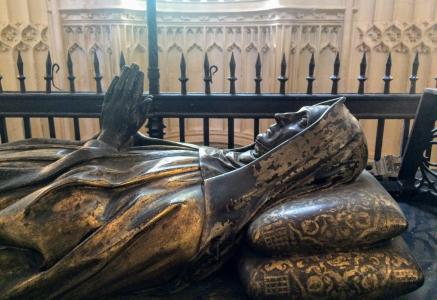 On 29 Jun 1509 Margaret Beaufort Countess Richmond (age 66) died in the Deanery, Westminster Abbey [Map]. She had lived to see the Coronation of her son King Henry VII of England and Ireland and her grandson King Henry VIII of England and Ireland (age 18).
On 29 Jun 1509 Margaret Beaufort Countess Richmond (age 66) died in the Deanery, Westminster Abbey [Map]. She had lived to see the Coronation of her son King Henry VII of England and Ireland and her grandson King Henry VIII of England and Ireland (age 18).

She was buried at the King Henry VII Chapel, Westminster Abbey [Map]. Her tomb was created by Pietro Torrigiano (age 36). The gilded bronze sculpture on the tomb depicts Margaret with her head resting on pillows and her hands raised in prayer, wearing garments characteristic of widowhood; the face was probably sculpted from a death mask. The black marble tomb is embellished with heraldic bronze insignia, including a Yale, her heraldic badge, at her feet.
Image Source: .
2nd Millennium, 16th Century Events, May 1509-1519 Coronation of Henry VIII and Marriage to Catherine of Aragon, Execution of Richard Empson and Edmund Dudley
Wriothesley's Chronicle 1510-1519. 1510. This yeare, in August, Sir Richard Empson (age 60)d and Edmund Dudley (age 48) were beheaded at the Tower Hill [Map].e
Two heretiques burned in Smithfield on St. Luke's day.
Note d. In MS. incorrectly written Sir Thomas Empson, which mistake is also made by Arnold.
Note e. In MS. this and the preceding entry have been accidentally transposed.
On 17 Aug 1510 Edmund Dudley (age 48) and Richard Empson (age 60) were beheaded at Tower Hill [Map] for constructive treason for having carried out King Henry VII's rigorous and arbitrary system of taxation. The new King King Henry VIII of England and Ireland (age 19) attempting to distance himself from his father's policies.

2nd Millennium, 16th Century Events, May 1509-1519 Coronation of Henry VIII and Marriage to Catherine of Aragon, Birth and Death of Prince Henry
Wriothesley's Chronicle 1510-1519. 01 Jan 1511. This yeare, Prince Henrie, the Kings (age 19) first sonne, was borne at Richmonde [Map] on Newe Yeares dayeb, and on St. Mathie's day [Note. 23 Feb] after the saide Prince died, and was buried at Westminster [Map].
Note b. On the 1st January, 1510 [Note. 1511 if years are adjusted to begin on 01 Jan.]
Note c. Or rather St. Mathias' eve, February 23. Hall, howerer, says that this Prince died on "the 22 Feb. being the Even of Saint Mathy," which would seem to show that St. Mathias' day was sometimes kept on the 23rd, instead of the 24th February, in which case our text is correct.
On 01 Jan 1511 Prince Henry Duke Cornwall was born to Henry VIII (age 19) and Catherine of Aragon (age 25) at Richmond Palace [Map]. He was appointed Duke Cornwall at birth.

On 22 Feb 1511 Prince Henry Duke Cornwall died. He was buried at Westminster Abbey [Map].
In Feb 1511 Henry VIII (age 19) celebrated the birth of his son by holding a magnificent tournament at Westminster [Map]. The challengers included Henry VIII (age 19) who fought as Cuere Loyall, Henry Courtenay 1st Marquess Exeter (age 15) as Bon Vouloir, Edward Neville (age 40) as Joyeulx Penser, Thomas Knyvet (age 26) as Valiant Desyr and Thomas Tyrrell. 




On Day 1 of the tournament the Answerers included: William Parr 1st Baron Parr of Horton (age 28), Henry Grey 4th Earl Kent (age 16), Thomas Cheney (age 26), Richard Blount and Robert Morton.


On Day 2 of the tournament the Answerers included: Richard Tempest of Bracewell (age 31), Thomas Lucy, Henry Guildford (age 22), Charles Brandon 1st Duke of Suffolk (age 27), Thomas Boleyn 1st Earl Wiltshire and Ormonde (age 34), Richard Grey, Leonard Grey 1st Viscount Grane (age 32), Thomas Howard 3rd Duke of Norfolk (age 38), Edmund Howard (age 33) and Henry Stafford 1st Earl Wiltshire (age 32).




Vesta Monumenta. 1726. A nearly sixty-foot vellum roll that illustrates the jousting tournament held by Henry VIII on 12 and 13 February 1510/11, along with the "articles of the tilt". Engravings by George Vertue (age 42) after the original manuscript.
A description of the Solemn Jousts held at Westminster the 13th day of February in the first year of King Henry VIII in honour of his Queen Katherin upon the birth of their eldest son Prince Henry AD 1510 taken from the original roll now in the College of Arms, London.

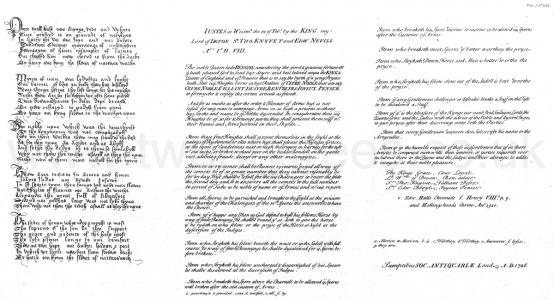
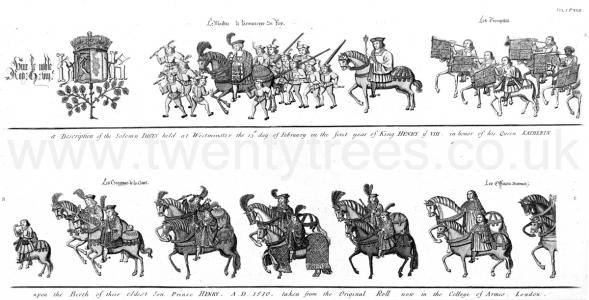
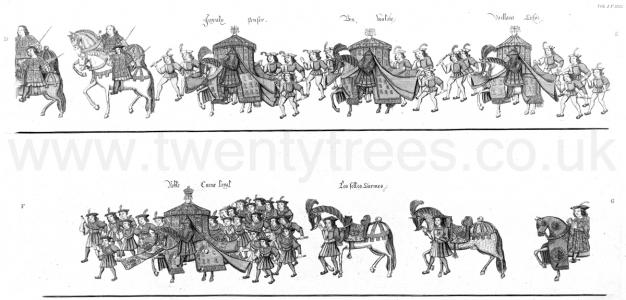
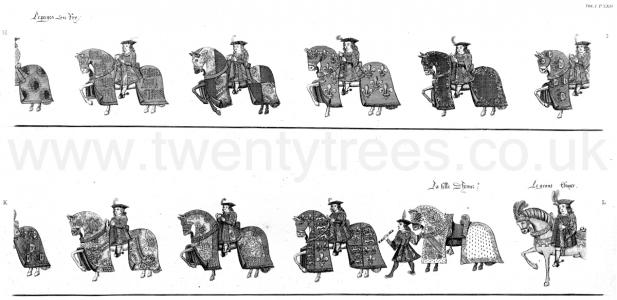
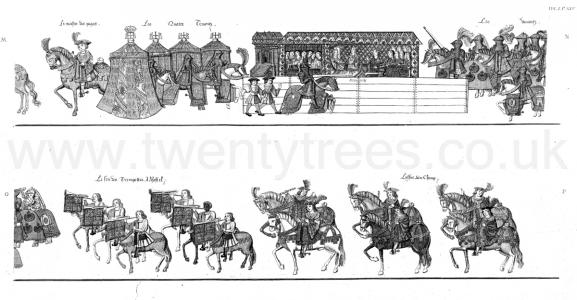
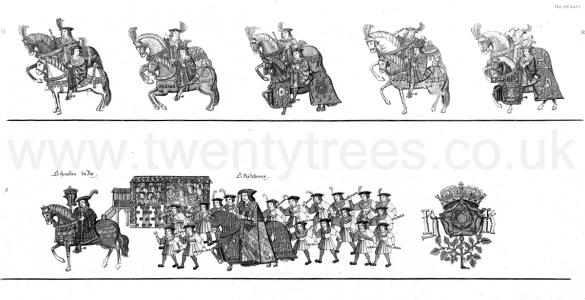
2nd Millennium, 16th Century Events, May 1509-1519 Coronation of Henry VIII and Marriage to Catherine of Aragon, Battle of Saint Mathieu
Wriothesley's Chronicle 1510-1519. 10 Aug 1512. This yeare the Regent of England, a shippe, and a carike of France, were burnt in Bristowe haveng, and Sir Thomas Knyvett (age 27) in her with all his men.
Note g. Note. This engagement, one of the most striking recorded in the annals of the English nayy, was fought off Brest Harbour on the 10th August, 1512, in which the Regent, a first-class English vessel, commanded by Sir Thomas Knyvett (age 27), Master of the Horse, and the French vessel Cordeliere, commanded by Primanget, called by the English chroniclers Sir Piers Morgan, were blown up with the loss of all their men. Hall's Chronicle, pp. 634-6. A letter of Wolsey, describing the loss of the Regent, may be seen in MS. Cotton. Vitcl. B. ii. p. 180.
On 10 Aug 1512 Edward Howard (age 36) commanded at Brest during the Battle of Saint Mathieu.
Thomas Knyvet (age 27) was killed in the fight between The Regent and La Reine
Letters. 23 Jan 1513. VENICE. [Copy of a letter received in February, 1512-13.] From Nicolo di Favri to Francesco Gradenigo, London, 23 Jan.-Description of English life and weather. Wrote on 10 Dec. that the camps were disarming. One was in Spain where the King of Spain failed to keep his promise of co-operation and the Spaniards shot at the English who went to eat grapes in a vineyard. Another, under the Lord Treasurer, was in Scotland, whose King made terms; and a third at sea. A French and an English ship were both burnt while fighting together, but whereas the French lost 200 gentlemen the English lost only the captain. Parliament (which met on All Saints Day), and continual resort of its members to the Ambassador's house. Great service done by the Ambassador. His straits for money. Frenchmen in England ill-treated. Taxation. The King and his affection for the Ambassador. News, just come, of four victories of the Spaniards over the French, and death of Mons. de la Palisse.
Note 2. [Note of letters received 1 March 1513.]From Andrea Badoer [, London], 23 Jan.-The King makes very great preparations against France, and the Council has decided that he may go in person. Every day he goes to hasten the Fleet and especially the great ship he is making. There is news that the Duke of Brunswick, captain of the Emperor and Madame Margaret, has been routed by the Duke of Guelders and lost two captains, one of whom, Mons. de Reselich, has been ransomed.
2nd Millennium, 16th Century Events, May 1509-1519 Coronation of Henry VIII and Marriage to Catherine of Aragon, 1513 New Years Day Gift Giving
Letters. 01 Jan 1513. The following pieces of plate received from William Holland of London, goldsmith, 1 Jan. 4 Henry VIII.
[Given in three columns (1) name of a person (to whom the article has been presented); (2), description of the article; and (3), its weight.]
Bishop of Canterbury (age 63), a cup with a gilt cover, 34 oz.
Lady Hastings (age 30), the same, 30¾ oz.
Sir H. Marney (age 66), the same, 23 oz.
Mr. Lupton (age 57), the same, 23 oz.
Sir E. Ponyngs (age 54), the same, 22¼ oz.
The Abbot of Abingdon, the same, 23¾ oz.
Sir Edward Haward, the same, 24 oz.
The old Lady Guylford (age 50), a little pot gilt, 17 7/8 oz.
Lady Lucy, the same, 16 7/8 oz. [Possibly Catherine Hastings (age 35) who married John Melton of Aston Yorkshire 10th Baron Lucy (age 37) before 1506]
Lady Mountjoy, the same, 16 7/8 oz.
Lady Bulleyn (age 33), the same, 16½ oz.
Lord Audeley (age 30), a salt with a gilt cover, 15¾ oz.
The Queen's grace (age 27), a pair of great pots gilt, 575 oz.
Mrs. Catesby, a proper bottle for rose water, 4 oz.
Mrs. Briget, the same, 3 7/8 oz.
Mrs. Lacy, the same, 4 oz. Which, at 5s. the oz., is £212 11s 10½d.
James Worsley, a proper pot, parcel gilt, 10 oz. Copynger, 8 spoons, part gilt, 9¾ oz., Amadas. Which is, at 4s. the oz., 76s. 6d.
In part payment, old plate to the value of £194 16s. 8d. has been delivered to him. The remainder paid by J. Heron (age 43).
On the dorse [reverse]:-Holland beseeches the King to reward him for the workmanship of the Queen's great pots, "for he cannot live to make such curious work at the price within written"; and £6 13s. 4d. is added in another hand, making a total due of £28 5s. Signed by the King.
On 01 Jan 1513 King Henry VIII (age 21) made New Years gifts as described in the Calendar Rolls.
2nd Millennium, 16th Century Events, May 1509-1519 Coronation of Henry VIII and Marriage to Catherine of Aragon, Siege of Thérouanne
On 24 Jun 1513 Edmund Carew (age 47) was killed at Thérouanne [Map] at the Siege of Thérouanne. Apparently by a cannon ball whilst he sat in council.
2nd Millennium, 16th Century Events, May 1509-1519 Coronation of Henry VIII and Marriage to Catherine of Aragon, Battle of the Spurs
On 16 Aug 1513 Henry VIII (age 22) fought at Thérouanne [Map] during the Battle of the Spurs. 
Henry's army included George Talbot 4th Earl of Shrewsbury (age 45) (commanded), Thomas Grey 2nd Marquess Dorset (age 36), Thomas Brooke 8th Baron Cobham (age 43), Henry Bourchier 2nd Earl Essex 3rd Count Eu, John de Vere 15th Earl of Oxford (age 42) and Anthony Wingfield (age 26). John "Tilbury Jack" Arundell (age 18), William Compton (age 31), John Hussey 1st Baron Hussey of Sleaford (age 48) and William Hussey (age 41) was knighted by King Henry VII of England and Ireland. Thomas West 8th Baron De La Warr 5th Baron West (age 56) and Andrew Windsor 1st Baron Windsor (age 46) was created Knight Banneret.










Louis I d'Orléans Duc de Longueville 1480-1516 was captured.
Arthur Hopton (age 24) was knighted for his bravery.
On 25 Sep 1513 William Compton (age 31) was knighted at Tournai [Map] after the Battle of the Spurs having mustered 578 soldiers from his manors.
2nd Millennium, 16th Century Events, May 1509-1519 Coronation of Henry VIII and Marriage to Catherine of Aragon, Battle of Flodden
Before 09 Sep 1513 King James IV of Scotland (age 40) based himself at Ford Castle [Map] before the Battle of Flodden.
On 09 Sep 1513 at the Battle of Flodden was fought at the Branxton, Northumberland [Map]. the English army was commanded by Thomas Howard 2nd Duke of Norfolk (age 70), Thomas Howard 3rd Duke of Norfolk (age 40), Edmund Howard (age 35), Thomas Dacre 2nd Baron Dacre Gilsland (age 45), Edward Stanley 1st Baron Monteagle (age 51) and Marmaduke Constable (age 56).



The English army included: Henry "Shepherd Lord" Clifford 10th Baron Clifford (age 59), William Conyers 1st Baron Conyers (age 44), Thomas Berkeley 5th Baron Berkeley (age 41) and Richard Neville 2nd Baron Latimer of Snape (age 45).



Randall Babington, John Bigod (age 38) and Thomas Fitzwilliam (age 39) were killed.


Marmaduke Constable (age 33), William Constable (age 38), George Darcy 1st Baron Darcy Aston (age 16), Edmund Walsingham (age 33), Thomas Burgh 7th Baron Cobham 5th Baron Strabolgi 1st Baron Burgh (age 25) and Walter Stonor (age 36) were knighted by Thomas Howard 3rd Duke of Norfolk (age 40).



Christopher Savage, Thomas Venables (age 44) and Brian Tunstall (age 33) were killed.
Bryan Stapleton of Wighill (age 55) was killed. (Some reports have him dying in 1518).
John Booth (age 78) was killed.
Father and son Ralph ellerker of risby in yorkshire and Ralph Ellerker were knighted by Thomas Howard Earl of Surrey (age 70).
The Scottish army suffered heavy casualties:
King James IV of Scotland (age 40) was killed. His body ws taken to London, then to Sheen Priory, Richmond; thereafter it dissappeared. His son King James V of Scotland (age 1) succeeded V King Scotland.
Alexander Stewart ArchBishop of St Andrews (age 20) was killed.
David Kennedy 1st Earl Cassilis (age 43) was killed. His son Gilbert Kennedy 2nd Earl Cassilis (age 18) succeeded 2nd Earl Cassilis. Isabel Campbell Countess Cassilis by marriage Countess Cassilis.
William Sinclair 2nd Earl Caithness (age 54) was killed. His son John Sinclair 3rd Earl Caithness succeeded 3rd Earl Caithness.
Matthew Stewart 2nd Earl Lennox was killed. His son John Stewart 3rd Earl Lennox (age 23) succeeded 3rd Earl Lennox.
William Hay 4th Earl Erroll was killed. His son William Hay 5th Earl Erroll (age 18) succeeded 5th Earl Erroll.
John Douglas 2nd Earl Morton was killed. His son James Douglas 3rd Earl Morton succeeded 3rd Earl Morton, 6th Lord Dalkeith.
Adam Hepburn 2nd Earl Bothwell was killed. His son Patrick Hepburn 3rd Earl Bothwell (age 1) succeeded 3rd Earl Bothwell.
Alexander Stewart 4th of Garlies (age 32) was killed. His son Alexander Stewart 5th of Garlies (age 6) succeeded 5th Lord Garlies.
Alexander Elphinstone 1st Lord Elphinstone was killed. His son Alexander Elphinstone 2nd Lord Elphinstone (age 3) succeeded 2nd Lord Elphinstone.
Thomas Hay, George Hepburn Bishop Isles (age 59), Adam Hepburn Master (age 56), Thomas "Younger of Cushnie" Lumsden
William Douglas 6th Lord Drumlanrig was killed. William "Younger" Douglas 7th Lord Drumlanrig succeeded 7th Lord Drumlanrig.
George Seton 5th Lord Seton was killed. His son George Seton 6th Lord Seton succeeded 6th Lord Seton.
John Hay 2nd Lord Hay of Yester was killed. His son John Hay 3rd Lord Hay (age 23) succeeded 3rd Lord Hay of Yester. Elizabeth Douglas Lady Hay by marriage Lord Hay of Yester.

Robert Keith Master of Marischal (age 30), Guiscard Harbottle (age 28), John Erskine, David Home (age 22), Andrew Stewart 1st Lord Avondale (age 43), Archibald Campbell 2nd Earl Argyll (age 64), Robert Douglas of Lochleven (age 89) were killed.
Henry Sinclair 3rd Lord Sinclair (age 48) was killed. His son William Sinclair 4th Lord Sinclair succeeded 4th Lord Sinclair.
James Stewart 1st Lord of Traquair (age 33) was killed. His son William Stewart 2nd Lord Traquair (age 7) succeeded 2nd Lord Traquair.
John Maxwell 4th Lord Maxwell (age 57) was killed. His son Robert Maxwell 5th Lord Maxwell (age 20) succeeded 5th Lord Maxwell.
William Murray (age 43), Colin Oliphant (age 26), William Ruthven (age 33), George Douglas (age 44) and William Douglas (age 42) were killed.

George Home 4th Lord Home and John Stewart 2nd Earl Atholl (age 38) fought.
Brothers David Lyon of Cossins, William Lyon and George Lyon were killed.
William Graham 1st Earl Montrose (age 49) was killed. His son William Graham 2nd Earl Montrose (age 21) succeeded 2nd Earl Montrose.
Robert Erskine 4th Lord Erskine 16th Earl Mar was killed. His son John Erskine 17th Earl Mar (age 26) de jure 17th Earl Mar, Lord Erskine.
Thomas Stewart 2nd Lord Innermeath (age 52) was killed. His son Richard Stewart 3rd Lord Innermeath succeeded 3rd Lord Innermeath.
Walter Lindsay of Arden and Walter Lindsay (age 33) were killed.
William Keith of Inverugie (age 43) was killed.
David Wemyss of Wemyss (age 40) was killed.
John Somerville 1st of Cambusnethan (age 55) was killed.
Robert Crichton 2nd Lord Crichton of Sanquhar (age 41) was killed. His son Robert Crichton 3rd Lord Crichton of Sanquhar (age 22) succeeded 3rd Lord Crichton of Sanquhar
Father and son William Rollo (age 59) and Robert Rollo 5th of Duncrub (age 34) were killed.
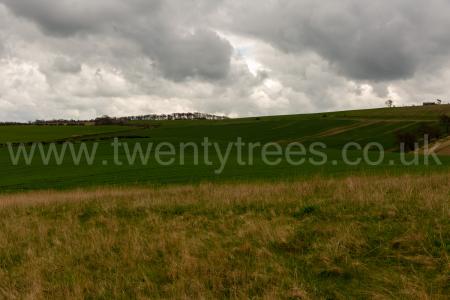
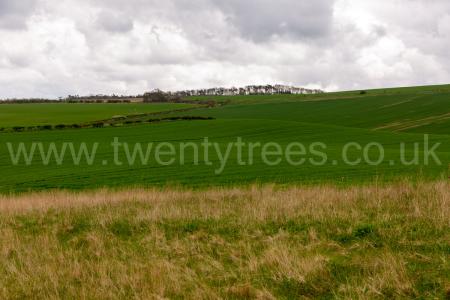
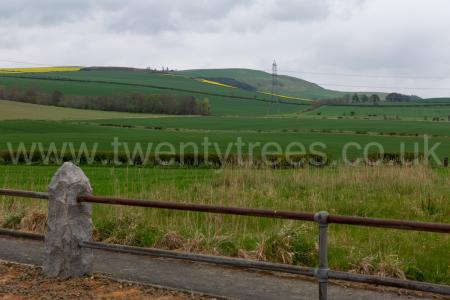


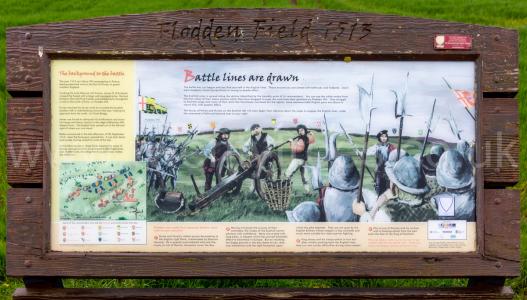
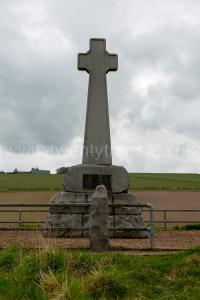
Ellis' Letters S1 V1 Letter XXXII. 16 Sep 1513. Queen Catherine (age 27) to King Henry VIII (age 22)th, after the Battle of Flodden Field. A. D. 1513.

[MS. COTTON. VESP. F. in. fol. 15. Orig.]
Sir
MY Lord Howard (age 70) hath sent me a Lettre open to your Grace, within oon of myn, by the whiche ye shal see at length the grete Victorye that our Lord hath sent your subgetts in your absence; and for this cause it is noo nede herin to trouble your Grace with long writing, but, to my thinking, this batell hath bee to your Grace and al your reame the grettest honor that coude bee, and more than ye shuld wyn al the crown of Fraunce; thankend bee God of it: and I am suer your Grace forgetteth not to doo this, which shal be cause to send you many moo suche grete victoryes, as I trust he shal doo. My husband, for hastynesse, wt Rogecrosse I coude not sende your Grace the pece of the King of Scotts (deceased) cote [coat] whiche John Glyn now bringeth. In this your grace shal see how I can kepe my premys, sending you for your baners a Kings cote. I thought to sende hymself (deceased) unto you, but our Englishemens herts wold not suffre it. It shuld have been better for hym to have been in peax than have this rewards. Al that God sendeth is for the best.

My Lord of Surrey (age 40), my Henry, wold fayne knowe your pleasur in the buryeng of the King of Scotts (deceased) body, for he hath writen to me soo. With the next messanger your grace pleasur may bee herin knowen. And with this I make an ende: prayng God to sende you home shortly, for without this noo joye here can bee accomplisshed; and for the same I pray, and now goo to our Lady at Walsyngham [Map] that I promised soo long agoo to see. At Woborne [Map] the xvj. day of Septembre.

I sende your grace herin a bille founde in a Scottisshemans purse of suche things as the Frenshe King sent to the said King of Scotts to make warre against you, beseching your a to sende Mathewe hider assone this messanger commeth to bringe me tydings from your Grace.
Your humble wif and true servant
KATHERINE (age 27).
Calendars. 22 Sep 1513. Have sent a message full of comfort to the schismatic king, thus:
The King of Scots, of all men the most perfidious, has been killed in fair fight by the Earl of Surrey, who attacked the king's own camp in a certain forest called Bermuiwood in England, all the nobility of Scotland being slain with the king. In the conflict 10,000 Scots were slain, and as many more in the flight. The battle was fought on the 9th of this month. All the ordnance of the Scots, their tents and the rest of their baggage were taken, the course of the whole business being as follows:
On the eve of St. Bartholomew the false and perjured King of Scots invaded England, and took the castle of Norham, not without shame to certain persons, razing it to the ground. He then led his army towards Berwick, burning the villages in every direction. The Earl of Surrey, Lord Dacres, Earl Latimer (Comes Latavier), Scrope (Scopre), and other great personages of those parts had not yet mustered, but each made such haste that on the 7th of September the Earl of Surrey summoned and challenged the aforesaid perjured King of Scots to give battle on the following Friday. Such was the reliance placed by that king on his French and Scottish commanders, that he thought all England together would not dare to oppose him; but the Earl of Surrey kept his engagement and promise. Lord Howard, the admiral, having heard that the King of Scots most boastfully proclaimed that he had long sought him by land and sea, as one who from fear always fled and avoided battle, quitted the royal fleet, left a deputy in command, forthwith landed and sent a message to the perjured King of Scots that he would lead the van of the army, not on horseback, but on foot, lest he should be supposed a craven and a runaway. He moreover warned the King of Scots not to take him alive, as he had determined not to capture any Scot, however noble he might be, even were it the king himself, but to kill him; promises which were fulfilled.
Accordingly on the appointed day the army attacked the Scots, whose forces were assembled on the summit of an hill, at the distance of a mile from its base, the hill being so strengthened and defended by ordnance that the assailants were obliged to wade through a certain marshy pass, leaving the guns in the rear.
The army of the Scots formed five lines in square battalions, representing the figure of a spear head; all being equidistant from the English army, which was divided into two lines with two wings. In spite of the Scottish artillery, which inflicted little or no damage, Lord Howard marched to the foot of the hill where he halted a short time, until the other wing of the rearguard had joined the last of his lines.
Thereupon the Scots came down the hill in very good order after the German fashion, with iron spears in masses. The Earl of Huntly, the Earl of Airlie and the Earl of Crauford broke upon Lord Howard. This force all perished, including the earls.
The perjured King of Scots attacked the Earl of Surrey, at whose side Lord Darcy's son was following; near him Lord Maxwell, a Scot, with Lord Herries, his brother, were killed, and practically all the rest of the Scottish nobles, the list of whose names had not yet been received. In these two engagements no prisoners were made, no quarter given. The Earl of Hauewes and the Earl of Argyle, with a very great force attacked Sir Edward Stanley, who slew the greater part of them. Lord Edmund Howard, who led his brother's right wing, was assailed by the Chamberlain of Scotland. He was thrice felled by the Chamberlain to the disgrace of his soldiers, who were cowards, but Lord Dacres succoured him with fifty horse. The Chamberlain of Scotland alone got home alive, although like the rest he lost all his men.
After the performance of these feats the entire army of the Scots took to flight. The rout began at noon and lasted until night. The English halbardiers decided the whole affair, so that in this battle the bows and ordnance were of little use. Only one English gentleman, an obscure knight, fell; the rest of the killed did not amount to four hundred.
Of the Scots upwards of 10,000 men were captured and slain in flight, and as many were killed on the battle field.
At the time of this engagement Lord Lovel was at Nottingham with 15,000 men, on his march towards Scotland, the queen being already forty miles beyond London with 40,000.
The Scots numbered in reality 60,000 men, though there were said to be 80,000. The English were 40,000, though reported to be only 30,000; and this is the end of James, late King of Scots, of all mankind the falsest.
At the time of this engagement Lord Lovel was at Nottingham with 15,000 men, on his march towards Scotland, the queen being already forty miles beyond London with 40,000.
2nd Millennium, 16th Century Events, May 1509-1519 Coronation of Henry VIII and Marriage to Catherine of Aragon, Death of Anne Duchess of Brittany
On 09 Jan 1514 Anne of Brittany Queen Consort France (age 36) died. She the last of the de Montfort family to hold the title (the Montfort family is a scion the Capet family; her father was descended from Louis VII King Franks. Claude Valois Orléans Queen Consort France (age 14) succeeded I Duchess Brittany. Claude (age 14) and King Francis I of France (age 19) married after which the Duchy of Brittany and the Crown of France were combined.
2nd Millennium, 16th Century Events, May 1509-1519 Coronation of Henry VIII and Marriage to Catherine of Aragon, Creation and Re-creation of Peerages
On 01 Feb 1514 King Henry VIII of England and Ireland (age 22) created and re-created two peerages ....
Charles Somerset 1st Earl of Worcester (age 54) was created 1st Earl Worcester.
Thomas Howard 2nd Duke of Norfolk (age 71) was restored 2nd Duke Norfolk probably for having secured victory at the Battle of Flodden after which his arms were augmented with an inescutcheon bearing the lion of Scotland pierced through the mouth with an arrow. Some documentation describes this as a creation rather than restoration although he is always referred to as 2nd. Agnes Tilney Duchess Norfolk (age 37) by marriage Duchess Norfolk

2nd Millennium, 16th Century Events, May 1509-1519 Coronation of Henry VIII and Marriage to Catherine of Aragon, Marriage of Mary Tudor and Louis XII of France
On 13 Aug 1514 Louis XII King France (age 52) and Mary Tudor Queen Consort France (age 18) were married by proxy at the Palace of Placentia, Greenwich [Map]. Louis I d'Orléans Duc de Longueville 1480-1516, a hostage in England at the time, stood in for Louis XII King France (age 52).

Wriothesley's Chronicle 1510-1519. 09 Oct 1514. A peace betwene the King (age 23) and French King (age 52) duringe both their lives; and the Ladie Marie (age 18), sister to the King (age 23), married to the French King (age 52),d at Abireld [Map],e in Picardye, in October.f

Note c. This paragraph has been misplaced in MS. before the preceding; the Parliament did not meet till the 3rd January, 1514.
Note d. The Princess Mary (age 18) was in her seventeenth year, and her husband Louis XII (age 52), to whom she was third wife, in his fifty-fourth year.
Note e. At Abbeville [Map], in Picardy. From which place Mary (age 18), three days after her marriage, wrote letters to her brother and Wolsey.
Note f. The marriage ceremony had been preriously celebrated at Greenwich by proxy, but was not consummated till October 9th. For fuller particulars, see Ellis's Original Letters, First and Second Series.
On 09 Oct 1514 Louis XII King France (age 52) and Mary Tudor Queen Consort France (age 18) were married at Abbeville, Somme. She by marriage Queen Consort France. Thomas Grey 2nd Marquess Dorset (age 37), Thomas West 8th Baron De La Warr 5th Baron West (age 57), Thomas Brooke 8th Baron Cobham (age 44) and his son George Brooke 9th Baron Cobham (age 17), Bishop Thomas Ruthall (age 42) and Margaret Wotton Marchioness Dorset (age 27) attended. The difference in their ages was 33 years. She the daughter of King Henry VII of England and Ireland and Elizabeth York Queen Consort England. He the son of Charles Valois Duke Orléans and Mary La Marck Duchess Orléans. They were second cousin twice removed.






2nd Millennium, 16th Century Events, May 1509-1519 Coronation of Henry VIII and Marriage to Catherine of Aragon, Louis XII King France succeeded by Francis I
On 01 Jan 1515 Louis XII King France (age 52) died. His first cousin once removed King Francis I of France (age 20) succeeded I King France: Capet Valois Angoulême.
2nd Millennium, 16th Century Events, May 1509-1519 Coronation of Henry VIII and Marriage to Catherine of Aragon, Wolsey receives his Cardinal's Hat
In 1515 Cardinal Thomas Wolsey (age 41) received his Cardinal's hat at a ceremony attended by Richard Neville 2nd Baron Latimer of Snape (age 47) and Robert Radclyffe 1st Earl of Sussex (age 32) at Westminster Abbey [Map]. 
2nd Millennium, 16th Century Events, May 1509-1519 Coronation of Henry VIII and Marriage to Catherine of Aragon, Ferdinand II King Aragon Dies Joanna Queen Castile Succeeds
Wriothesley's Chronicle 1510-1519. 23 Jan 1516. The King of Spayne (age 63) died.
On 23 Jan 1516 Ferdinand II King Aragon (age 63) died. His daughter Joanna "The Mad" Trastámara Queen Castile (age 37) succeeded Queen Aragon.
2nd Millennium, 16th Century Events, May 1509-1519 Coronation of Henry VIII and Marriage to Catherine of Aragon, Catherine Queen Navarre Dies Henry II Succeeds
On 12 Feb 1517 Catherine Grailly I Queen Navarre (age 49) died. Her son King Henry II of Navarre (age 13) succeeded II King Navarre.
2nd Millennium, 16th Century Events, May 1509-1519 Coronation of Henry VIII and Marriage to Catherine of Aragon, Birth of Princess Mary
Wriothesley's Chronicle 1510-1519. 18 Feb 1516. This yeare the Ladie Marie, Princes, was borne at Greenewich, in Februarie.
February 18th.
On 18 Feb 1516 Queen Mary I of England and Ireland was born to Henry VIII (age 24) and Catherine of Aragon (age 30) at Palace of Placentia, Greenwich [Map]. Margaret Bourchier 1st Baroness Bryan (age 48) was created 1st Baron Bryan and appointed the child's governess. Catherine York Countess Devon (age 36) was her godmother.


2nd Millennium, 16th Century Events, May 1509-1519 Coronation of Henry VIII and Marriage to Catherine of Aragon, Evil May Day Riots
On 30 Apr 1516 the Evil May Day Riots were a protest against foreigners living in London. Apprentices attacked foreign residents. Some of the rioters were later hanged.
On 01 May 1517 Thomas Howard 2nd Duke of Norfolk (age 74) entered the City with 1300 of his retainers to suppress the Riots.
On 04 May 1517 thirteen of the rioters were executed.
2nd Millennium, 16th Century Events, May 1509-1519 Coronation of Henry VIII and Marriage to Catherine of Aragon, 1517 Jousts
The Life and Times of Cardinal Wolsey Volume 2. Jun 1517. In the Beginning of the Month of June, his Majesty caused a grand Joust to be prepared for the Entertainment both of himself and the foreign Ambassadors, in which our young Monarch appeared against the Duke of Suffolk (who came to attend the King at this Sport) having each twelve Noblemen and Gentlemen of a Side, richly habited according to the Custom of those Times.
His Majesty, attended by Gentlemen Armorers and other Officers, to the number of 125 persons, clothed in white velvet, first entered the ring on one side, and the Duke of Suffolk, the Marquis of Dorset, the Earls of Essex and Surrey, with several others of his band, entered on the other; then the trumpets blew, and the King and the Duke immediately engaged, and ran fiercely at each other, whilst the other parties were no less active and such was the pastime of the day, according to the report of Sir Edward Guilford (age 43), Master of the Armoury, and of the Judges and Heralds in waiting, that there were no less than five hundred and six spears broken. The sport being over, his Majesty entertained the Ambassadors and his Court with a sumptuous supper; proposing to continue these jousts, at proper times, during the summer, which were then looked on as the most healthy exercise in being.
2nd Millennium, 16th Century Events, May 1509-1519 Coronation of Henry VIII and Marriage to Catherine of Aragon, 1517 Sweating Sickness Outbreak
Annales of England by John Stow. 18 May 1517. The 18 of May, Margaret Queene of Scots departed trom London towards Scotland, richly appointed and prepared of all things necessary for her estate through the kings great liberality. She entered into Scotland the 13 of June and wwas received at Berwick by Archibald Douglas Earl of Angus her husband. In the moneth of June there were with the king divers Ambassadors from foreign parts. In honour of whom, and for their their solace, he prepared costly jousts, be himself and twelve other, taking upon them to joust with the Duke of Suffolke (age 33), and twelve of his partakers. There were broken between the parties on both sides five hundred and eight spears.
Aug 1517. About the feast of Lammas began the sweating sicknes, of the which many men died suddenly in the beginning thereof, and this plague continued till Michaelmas [29 September], many died thereof in the court, as the Lord Clinton (age 27), the Lord Grey of Wilton (age 20), and many other knights and gentlemen, by reason of which contagious sickness, Michaelmas terme was adjorned. After this, to wit, in the winter was a greate death of pestilence, almost over all Englande in every town more or less, wherefore the King kept himself with small company about him, willing to have no resort to the court for fear of infection.

Around Jun 1517 Thomas Grey 11th Baron Grey of Wilton (age 20) died of sweating sickness. He was buried at the St Peter's Church, Merton. His brother Richard Grey 12th Baron Grey of Wilton (age 10) succeeded 12th Baron Grey of Wilton.
In Jun 1517 Thomas Clinton 8th Baron Clinton (age 27) died of sweating sickness. His son Edward Clinton 1st Earl Lincoln (age 5) succeeded 9th Baron Clinton.
The Life and Times of Cardinal Wolsey Volume 2. Around 15 Jun 1517. But his Majesty was soon interrupted in his intention, for, before June was expired, there broke out among the people a distemper, called the Sweating Sickness, which made great ravage in the Kingdom especially in London. It was otherwise termed the Sudor Anglicanus, or the English Sweat; "which carried off, says Lord Herbert, divers Knights, Gentlemen, and Officers of the King's Courts, particularly Lord Clinton (deceased)1, Lord Grey of Wilton (deceased), and "others of quality." In some places it took away a third, in others half the people. This plague continued from the latter end of June to December during which time the Judges adjourned the Term, and his Majesty kept no Court, but was only attended by his own Family and his Prime Minister, Wolsey ; and Hall says he much lamented the affliction that thus attended his people.

No sooner did this infectious distemper cease, but it was succeeded, as Stow relates, by so great a Drought, that it did not rain from December to May following, and the frost was so hard in the Winter, that Horses and Carts passed over the ice between Westminster and Lambeth.
Note 1. From this Nobleman [Thomas Clinton 8th Baron Clinton (deceased)] the late Right Honourable Henry, Earl of Lincoln, was descended, who was Paymaster of the Forces in the Reign of George the III. His Lordship married Lucy, sister of his present Grace, Thomas, Duke of Newcastle, by whom he had issue two sons, George and Henry besides Daughters. The Earl died the 7th of Sept. 1728, and his Countess the 20th of July, 1736; and his Lordship was succeeded in his Honour and Estate by George, his eldest son, a young Nobleman just arrived at Age, who gives room for great Expectations. The Title of Lord Clinton is now enjoyed by the Right Hon. Hugh Fortescue, who was called up by Writ to the House of Lords on the 16th of March having first made out his claim to the satisfaction of his Majesty and the House of Lords.
Letters and Papers 1517. 25 Jun 1517. Vit. B. III. 179*. B. M. 3399. A. CARDINAL OF ARRAGON to WOLSEY.
Had gone from Bruges to Calais for the purpose of visiting England, as he wrote a few days since; but hearing that the sickness was prevalent, resolved to change his mind and pass through France into Spain. Calais, 1517. Signed.
Lat., p. 1, mutilated. Add.
Letters and Papers 1517. 30 Jun 1517. Galba, B. VI. 224b. B. M. 3421. G. DE CROY (CHIEVRES) to the ENGLISH AMBASSADOR.
Has received his letters. Regrets that the sickness still prevails in England. Has heard nothing of the going of the Duke of Albany, and the dispatch of the Scotchmen, since they conferred together, but has written about it. The King will be at Middleburgh on Tuesday.
Hol., Fr., p. 1, mutilated. Add.
Letters and Papers 1517. 06 Aug 1517. Giust. Desp. II. 113. 3558. SEB. GIUSTINIAN to the DOGE.
The Catholic King is in Zealand, waiting to embark. Great cruelties have been committed by the Duke of Gueldres in the invasion of Friesland. As the King, in consequence of the new malady, had withdrawn himself to a distance, found great difficulty in speaking with him. "This disease makes very quick progress, proving fatal in twenty-four hours at the furthest, and many are carried off in four or five hours. The patients experience nothing but a profuse sweat, which dissolves the frame, and when once the twenty-four hours are passed all danger is at an end." Many of his own household are sick. Few strangers are dead, but an immense number of natives. Presented the King with the letters from the Signory and Hadrian, which last he "extracted from the packet addressed by his lordship to the Cardinal of York;" otherwise Wolsey would never have delivered it to his majesty. The King said he was perfectly acquainted with the business, and had heard from the Pope that he intended to deprive and degrade Hadrian. On Sebastian's endeavoring to excuse the Cardinal's absence from Rome, rather than incur danger, the King said: "I understand this matter better than you Venetians;" and seemed greatly exasperated against him. Thinks this is owing to Wolsey. Would have presented the letter to Wolsey, but he "has been ill of this sweating sickness, and would that the perspiration had carried off his wish for these benefices." Many of his household have died from the sweat.
Sebastian's son has returned from the Bp. of Winchester; his audience was delayed because this prelate likewise had taken the sweat. He had a gracious welcome by Fox, who represented the matter as desperate, saying: "We have to deal with the Cardinal, who is not Cardinal but King, and no one in the realm dares attempt aught in opposition to his interests." He was already in possession of the see, and Fox had resigned the administration of it. He said that one of the pontifical briefs greatly exaggerated Hadrian's crimes, and urged that the see of Bath should be given to Wolsey in commendam. But in the second brief the anger of the Pope was much softened, and he seemed to delay the execution of the former one. The second brief, however, is not to be found, and your highness will comprehend by whose means it has been secreted. The Bp. also wrote a letter to Chieregato, of which Sebastian encloses a copy. London, 6 Aug. 1517.
Letters and Papers 1517. 09 Aug 1517. R.O. 3572. SIR RICHARD WINGFIELD to WOLSEY.
Yesterday the Cardinal of Arragon left Calais. He did not go, as Wingfield wrote in his last, to Cambray, to visit the King Catholic, but to Boulogne, thence of Rouen, and so to Spain, to wait the King's arrival, if he can go there this year. He told Wingfield he intended to return from Spain and cross to England. He was sorry it was not his fortune to visit the King at that time in consequence of the plague in London and other places, and left, at his going, a letter for Wolsey. He travels like a nobleman, and has forty horses with him. Yesterday se'nnight the King of France entered Rouen. Has sent a spy to see what he is doing, and return by the seacoast to find what ships are at Dieppe. Calais, 9 Aug. Signed.
Letters and Papers 1517. 20 Aug 1517. R.O. 3608. SPINELLY to BRIAN TUKE.
Wrote yesterday with a packet for the Bp. of Helna, &c., and of a bill refused him by Galterotte on account of the sickness. Is in great favor there, and in a condition to do Wolsey effectual service. The wind is S.W. All things are aboard ready for a fair wind, which is expected about the opposition of this new moon. Begs he will see his patent sealed. Chievres told him the French had resolved to send Albany to Scotland, and he will take his passage by Brittany. In Chievres' absence the Lord Montayny will write to the Bp. of Helna. The Prince Palatine has left in disgrace because he presumed to write a letter to the Lady Eleanora, the King's sister, without the knowledge of the King, desiring her to marry him. The letter got abroad, and, though it was very honest, Chievres prevailed to have him punished for his presumption. The Prince is still there. News has come from Rome. The Lord of Nassau has killed divers Almains in the service of the Duke of Gueldres lying in the villages. Is to advertise Wolsey of the news, except touching the Lady Eleanora. Begs he will send him the man he spoke of. Middelburg, 20 Aug. 1517.
Hol., pp. 3. Add.
Letters and Papers 1517. 27 Aug 1517. Giust. Desp. II. 126. 3638. SEB. GIUSTINIAN to the COUNCIL OF TEN.
His majesty is at Windsor with his physician, Dionysius Memo, and three favorite gentlemen. No one is admitted, on account of the disease, which is now making great progress. The Cardinal has been ill until now, which is the fourth time. The Scotch affairs are settled. The Catholic King is in Zealand. Saw a letter from the King's ambassador with the Swiss, by which it appears the understanding between the Emperor, the King and the Swiss is not so good as before. Thinks it arises from their craving for money, which is not agreeable to those in authority here, as they now think it prudent to husband their resources, contrary to their previous custom. London, 27 Aug. 1517.
Letters and Papers 1517. 27 Aug 1517. Galba, B. V. 304. B. M. 3641. TUNSTAL to WOLSEY.
John de la Souche has returned, and makes report of his good reception. Has received the writings of the confirmation, of which he thinks Wolsey must have known by his letter of the 24th July. The Count Palatine has departed, to the astonishment of all, as he was ready to sail with the King, and in high favor. Spinelly writes of it. His friends think that Chievres was the cause of it, who wishes to obtain for his nephew, Count Porsenne, the daughter of Gondisalvo Ferdinando, who was promised to the Count Palatine. It would have been hard to break this betrothal, as the lady had sent the Palatine tokens by a religious man. Porsenne is small of growth, and not like the other in birth or body. The Emperor has written in behalf of him. Others say Chievres was jealous of his favor with the King. His enemies say that he wrote a letter to Lady Eleanor, the King's sister, asking her to marry, "which letter the King found in my Lady Eleanor's bosom himself, saying that the said Count had shrewdly recompensed him for the good choice that he hath had, to demand of his sister marriage, not making him privy." The King would listen to no intercession in his favor, whether of his own mind or not, Tunstal cannot say. He is much regretted. Does not think the King will leave, as the wind is so contrary and the moon is waning: though the King asserts he will go even if it be in winter. Chievres pretends not to care about the marriage. Cardinal Croy has the archbishopric of Seville, lately void, worth 20,000 ducats. There is great talk of the sweating sickness, which he is glad to hear Wolsey has escaped. Many urge this as a reason for staying the King, as he could not land in England if overtaken by a storm. Mydelborgh, 27 Aug.
Hol., pp. 3, mutilated. Add.
Letters and Papers 1517. 31 Aug 1517. R.O. 3657. The BP. OF WORCESTER to WOLSEY.
The Pope and cardinals have heard with great grief of the sweating sickness in England, and are glad to hear that the King and Wolsey have escaped the danger. Much laments the death of Andrew Ammonius, who was the King's faithful servant and the ornament of the Latin tongue. He had no fellow. The Pope would be glad to see the writer installed in the vacant place of collector in the same way as held by Hadrian, considering the same has been held by the family of De Gigli, and especially by John de Gigli, his uncle. Has accepted the office with pleasure, believing it would be agreeable to the King. Begs he may have the King's patent for it. Has fixed upon a person to execute the duty of collector there, who, he hopes, will be agreeable. Recommends highly Peter Vannes, Ammonius' cousin, a man of good family and education, who served under Ammonius for four years. Rome, 31 Aug. 1517. Signed.
Lat., pp. 5. Add.
Letters and Papers 1517. 12 Sep 1517. Giust. Desp. II. 129. 3675. SEB. GIUSTINIAN to the DOGE.
A French ambassador has arrived from the Emperor, a man of no account, apparently only to borrow money. He has not yet had an audience, either of the King, who keeps aloof at Windsor to avoid the sickness, or of Wolsey, who has gone to Walsingham. London, 12 Sept. 1517.
Letters and Papers 1517. 19 Sep 1517. R.O. 3692. SPINELLY to HENRY VIII.
The King Catholic arrived this morning on the coast of Biscay, but has not yet decided where to land, as the sickness is raging. A ship was burnt between Dovor and Wynselse, containing the King's horses and apparel, commanded by a Burgundian named Mont Richard. No help could be given. On the third day reached Usent with a strong wind from the S.E., when they deliberated about going to Plymouth. Since then they have been becalmed. At sea at the Sell, 19 Sept. 1517. Signed.
Pp. 2. Add.
Letters and Papers 1517. 26 Sep 1517. Giust. Desp. II. 130. 3697. SEB. GIUSTINIAN to the COUNCIL OF TEN.
Has left London to avoid the plague. Has heard of another conspiracy of the mob to murder the strangers and sack their houses. Thinks it was suggested by the absence of the King, Cardinal and other lords, who have gone in the country. The city is prepared: 3,000 householders are under arms. Three of the ringleaders have been arrested. Desires to return home. The present session will last all October, after which there will be no reason for him to stay. Westminster, 26 Sept. 1517.
Letters and Papers 1517. 27 Sep 1517. R.O. 3700. MARGARET OF SAVOY to HENRY VIII.
In behalf of Jacques Pauye, nephew of the late Mich. Pauye, confessor of the King Catholic, who in his uncle's lifetime had been provided by exchange with a prebend in Tournay, and would have gone personally to Wolsey to receive collation but for the prevailing sickness. Brussels, 27 Sept. 1517. Signed.
Fr., p. 1. Add.
Letters and Papers 1517. 06 Oct 1517. Egert. 616, No. 43. B. M. 3723. Extracts from the BP. OF HELNA'S letters.
Delivered Charles's letter to the King of England, and declared his instructions. The King replied that he had as much care for the dominions of Charles as for his own, and was bound to defend them when necessary. He wishes Charles to send ambassadors that he may show this more openly, and promises nothing shall be done except to Charles's advantage. This he seemed to say with great good will. He further said France was using every effort for a league with England, but Charles might rest assured he (Henry) would never join any prince to his detriment. Helna said Charles would not be uneasy at his making peace with France if it were not to the detriment of Spain; at which the King was much pleased. It seemed as if he wished to make peace with France.
Heard two things from the Cardinal: 1. that if Charles had wished to negotiate to have Tournay, England would not have objected; and if Helna had had powers to treat he believed it would have been brought to a good issue,—at least he would have thrown difficulties in the way of the French; but the Cardinal did not believe Charles wished to have Tournay. 2. If Tournay is to be delivered to the French, Wolsey will see that it is not to the disadvantage of Charles, although Charles has much to do with the French contrary to the wish of England. Wolsey told him at the same time, though not distinctly, that England would come to an agreement with France, and would send as ambassadors the Chamberlain and another to meet the French at Boulogne or Calais, and that before anything was concluded he would inform Charles of the offers of the French and the answer of England. Hears the French make great efforts to recover Tournay. Suspects that the King of England supports with ill will "los hastos" that he has made in Tournay, and that if Charles would bear part of the expence England would be glad to keep it; if Charles would give a sum, even though not so large as the French offer, Henry would give it up to him, and that these offers were made to him by an Englishman, as if from himself, but he suspects they come from a good quarter.
News of Scotland.
The departure from thence (England) of the Papal ambassadors, 21 October. The King of England is quite determined on peace with the French. The King and Wolsey have told him that they will not listen to other conditions but the old ones. The King of England is endeavoring to bring the French ambassadors, now at Boulogne or Calais, over to England. Many say that the French will not pass over, but that the English will cross to Calais. Thinks Wolsey a good servant of Charles. The King of England has withdrawn from all business on account of the pestilence.
Spanish, pp.2. Endd. in the same hand.
Chronicle of Robert Fabyan 1517. 11 Oct 1517. And upon the eleventh day of October next following, then being the sweating sickness of new begun, died the said Thomas Hall then of London mayor, and for him was chosen as mayor Sir William Stocker knight and draper, which died also of the said sikeness shortly after; and then John Ward, grocer, was chosen mayor, which so continued till the Feast of Simon and Jude following.
Letters and Papers 1517. 15 Oct 1517. Harl. 6989, f. 25. B. M. 3747. Pace (age 35) to WOLSEY.
In fear of the great plague. Young Lord Grey died of it this night. An Almain servant of the King died before him. Today arrived a Spanish friar, named by his company a saint, alleging that he worked miracles in the late tempest at sea, which ceased at his bidding, "ipso cœlo id protestante dimissis in navem magnis luminaribus." He had an hour's interview with the King, with what result Pace (age 35) knows not, except that the King esteems him more a friar than a saint. He has professed the order of St. Jerome many years; has no learning, but more than Spanish impudence. The King spends the time in hawking. Windsor, 15 Oct.
Hol., pp. 2. Add.: To my Lord Legate's grace.
Letters and Papers 1517. 02 Nov 1517. R. O. 3770. The UNIVERSITY OF OXFORD to WOLSEY.
Had been prevented from replying to his two previous letters by the sweating sickness, and for reasons which their commissary will tell him, whom they highly recommend. They have, in compliance with his wish, so modified the sentence passed on John Haynes and his son that neither can be much hurt. It was determined, however, that they should remain at Oxford, on condition of their satisfying the injured, and their good behavior; notwithstanding which Haynes has, without provocation, left Oxford. They have not yet been able to ascertain, as Wolsey desired, whether William Baker and Thomas Buklond were the authors of the fire which happened there. They have, however, expelled them. Buklond, who had been thrown into prison for another offence, has escaped, and fled with Baker. Oxford, postridie calendas Novembris.
Lat., p. 1. Add.: Card. Ebor. ac totius Angliæ Cancellario.
Letters and Papers 1517. 08 Nov 1517. Vit. B. III. 180. B. M. 3781. SILVESTER BP. OF WORCESTER to WOLSEY.
On the 3 Nov. received his agreeable letters, dated the 18th Oct., with Wolsey's excuses for writing so seldom, and his promise to write oftener hereafter. The state of affairs requires more frequent correspondence on both sides. Is sorry to hear of the sweating sickness having been so bad in England, and Wolsey's danger. Is glad the royal family have escaped. The Pope has only put off the deprivation of Cardinal Hadrian to follow the course of justice. When the 40 days are at an end, during which the Pope is absent for the sake of his health, process cannot long be delayed; and as the Pope has told him, he considers Hadrian deserving of this deprivation, not merely for the reasons stated in the King's letter, but for his many crimes. He has acted always so faithlessly that every one desires his fall. The Pope says nothing shall change his mind. At last he speaks positively, and Worcester is inclined to believe him; but if it prove otherwise Worcester must not be blamed. Has done all he could in the matter, and reported the Pope's words exactly, as the Pope himself desired him. But in this court, as in others, nothing can be effected without gifts; and Worcester will distribute a few, as sparingly as he can. The Pope is most grateful to Wolsey for letting him know of the French embassy coming to England, and promising that nothing shall be negociated against the interests of the Holy See. As to the pension Wolsey has promised him, Worcester will depend upon his bounty. Has received the original deed of endowment of the King's house, and will use it when occasion offers. Thanks Wolsey for the protection granted to his cousin John Campucci.
(Here a leaf or more is evidently lost.) * * * "[nume]rosam classem tormentis atque aliis machinis et instrum[entis belli]cis optime munitam et instructam parat, ut proxima ... æstate magnam aliquam suscipiat provinciam, aliquodque cru ... gerere possit, quod contra rempublicam Christianam futurum omnes ... te scribunt, licet dignosci præcise non possit quo adhuc animu[m] suum converterit." The Pope summoned the ambassadors of all princes, and, in presence of the Cardinals, with tears in his eyes, related this unhappy news, conjuring them by the mercy of God to beseech their sovereigns to come to some speedy determination for the protection of Christendom. It is thought the tyrant will first attack Hungary and Poland. It is needful to have a good fleet to turn the war into his own country. If he be not resisted now the danger to Christendom is manifest. All the ambassadors, except Worcester and the Emperor's, have commissions from their princes; the latter expects one. Worcester excused the King not having sent one, by reason of the sweating sickness, and declared openly that Henry had frequently shown his zeal for the defence of Christendom, as the Pope could testify. The French ambassador said he had been very urgent with the Pope for a universal peace. Worcester replied, that the object was a very desirable one, but it was important that it should be sincere and unfeigned, and not a pretext for injury, and that if all were as well disposed to it as England the expedition could be easily accomplished.
"Præterea sanctissimus dominus noster mihi dixit se certo scire regem Catholicum proximis præteritis diebus Illustrissimæ Dominæ Margaritæ manu propria scripsisse, quod nullo pacto auderet se in administratione dominiorum Flandriæ amplius impedire, si ejus gratiam et vitam propriam caram habebat, sed dicta dominia administranda relinqueret illis, de quibus videbitur domino de Cevres et ille significaret; quo facile cuique judicium esse potest, dictum dominum de Cevres administrationem ipsius regis Catholici ut prius in manus habere; quod non est valde opportunum, ut dominatio vestra reverendissima sua innata prudentia optime cognoscere potest. Sanctissimus dominus noster ratum et gratum habuit fædus nostrum, ut ex forma bullæ desuper jam confectæ et plumbatæ apparet, quam ejus sanctitas intro octo dies mihi omnino dare promisit. Declaravi sanctissimo domino nostro quod illa brevia [quæ po] stremo ad D. V. Reverendissimam misi pro decima, non erant illius tenoris cujus ipsa commiserat, et iccirco rursus nunc alia brevia ... secundum informationem ab ea acceptam, ut ex eorum exemp[10] .. poterit. Ego video quod sanctissimus dominus no[ster] tantum fidei promissis sibi de decima factis [ha]buit, ut nullo pacto existimare possim quin m[axi]mam caperet displicentiam et indignationem ni eam haberet. Iccirco dominatio vestra reverendissima velit sua prudentia et autoritat[e] præsentis inopiæ ejus sanctitatis opportune [mi]sereri, efficereque ut promissis eidem ab[Re]gia Maiestate et dominatione vestra Rev[eren] dissima factis fideliter stetur, et ego cer[tus sum] ut ejus quoque sanctitas promissa observet [fideli]ter. Si dominatio vestra reverendissima in meam [con]descenderit sententiam, pecuniæ non persol[ven]tur, nisi solutis ad plenum promissis; inte[rea] vero dominatio vestra reverendissima omnem [di]ligentiam adhibere potest, ut dicta decim[a] cedatur et exigatur; qua concessa eidem [senten]tiam meam aperiam, quæ non inutilis erit e... longioribus intelliget."
Complained to his holiness that he had deferred giving Wolsey the licence for the bull of Tournay. He must be content to wait a month longer. As to Peter Vannes, Wolsey's devoted servant, would gladly assist him, as requested, for three reasons;—because Wolsey wishes it, out of regard for Andreas Ammonius, and because Vannes deserves it; but is so much in debt on account of the collectorship conferred on him, that he can only give him a small assistance. Will remember him at some more convenient time. Thanks him and the King for writing in his behalf about the collectorship, and for not favoring his opponents. Rome, 8 Nov. 1517.
Hol., pp. 10, Lat., part cipher, undeciphered. Add. f. 211*.
Letters and Papers 1517. 11 Nov 1517. Giust. Desp. II. 135. 3788. SEB. GIUSTINIAN to the DOGE.
Has received their letters, which he communicated to the Cardinal, who is now gone to a place of his in consequence of the sickness. The Bp. of Paris and De la Guiche have arrived as ambassadors from France. They could not obtain admission to the King through fear of the plague. "I endeavoured to learn the cause of their coming, but the Reverend Bishop of Ely having made his appearance, I had no opportunity. It is said that they have come about certain reprisals, but I do not believe that envoys of such dignity would have been sent on so trivial an errand, especially as the aforesaid Bishop of Ely and the Lord Chamberlain, who had been appointed as envoys to France, will now not go there." The King is abroad, and moves from place to place on account of the plague, which makes great ravages in the royal Household. Some of the pages who slept in his chamber have died. None remain with him except three favorite gentlemen and Memo. Violent storms have destroyed the shipping. London, 11 Nov. 1517.
Letters and Papers 1518. 05 Mar 1518. R. O. 3985. Pace (age 36) to WOLSEY.
Has heard from the Lord Steward that there is some doubt whether the King will return towards London: he has had no commandment as yet to make provision but by the ways specified "in such gists as he hath send unto your grace." He knows no reason why the King's mind is changed. Thinks the King must leave this for London, as they cannot abide here, and there is no horse meat at Woodstock. The King wishes to know from Wolsey whether any of the royal palaces near London are infected with the sickness. Abyndon, 5 March.
Hol., p. 1. Add.
Letters and Papers 1518. 05 Mar 1518. Er. Ep. App. 263. 3993. ERASMUS to BOVILL.
Was glad that he escaped the detestable sickness. Congratulates Croke and the University. Is surprised that any should be found there to take the part of Faber. Would have acted otherwise had it been Standish and not Faber: "longo aliter belluam accepissem." Has completed the New Testament. Has received a letter from Grey, dated Paris. Begs his compliments to Vaughan, Humphrey, Brian, Watson and Gerard. Louvain, 5 March 1518.
Letters and Papers 1518. 15 Mar 1518. Giust. Desp. II. 166. 4009. Sebastian Giustinian to the Doge.
Rode to the King at Richmond, who is in some trouble, as three of his pages have died of the plague. Was graciously received: told him the news of the Turks, from whom, his majesty said, there was nothing to fear this year, as he had received intelligence from Rhodes. Sebastian pointed out the threatening nature of their preparations. The King laughed, and said Venice was on such good terms with the Turk, she had nothing to fear. Sebastian replied, they had made terms with Selim out of necessity, and from dread of the formidable power of the Sultan. "Tell your Signory," said the King, "there is a person more formidable than the Turk, who denies he has engaged any lansknechts, and yet I know he has hired them at two crowns per man." Sebastian replied, he thought it very unlikely such a thing should have escaped the knowledge of so wise a man as the Venetian ambassador in the French court. "Upon this the King drew me nearer to him, and also took my secretary by the hand,—a gesture he repeated several times in the course of the conference,—saying, 'Shall I give you manifest proof of the deceit of this King of France ?'" and then went on to insist that the forces which Francis pretended to marshal against the Turks were really intended against Italy. Sebastian combated this notion without appearing to contradict him. The King urged, "He wishes me worse than he does the devil himself; yet you see what kind of friendly language he employs towards me, in order that I may trust such deceit: but I am so prepared that, should the King of France attempt to attack me, he will find himself deceived." He then insisted on the refusal of France to do justice to his subjects; the sending of Albany into Scotland; "where he will perhaps put the King to death in like manner as his brother died, which I never intend to suffer; nor will I tolerate his presence there; and should he send him, I shall hold the said King my enemy." He then enlarged upon the love of interference on the part of Francis. Sebastian turned the conversation, endeavoring to avoid his resentment, urging that the Signory acted towards both crowns impartially. The King expressed himself satisfied, and told Sebastian he was not to detail these conversations to the ambassador in France; which, however, he intends to do. London, 15 March 1518.
Letters and Papers 1518. 06 Apr 1518. R.O. 4060. Pace (age 36) to WOLSEY.
The King has this day summoned his Council, and stated that London was still infected with sickness; therefore he must avoid it. He thinks that the infection is kept from Wolsey's knowledge, as it was from his when he was there; and notwithstanding the scarceness in the country about Abingdon he is compelled to remain in places thereabouts, as comprised in the bill enclosed. Wolsey is to certify the King whether there are a sufficient number of the Council in attendance on him for the business of the next term, and advises him to leave London when it is over. Will be heartily welcome to the King if he chooses to come. Wishes a train of horses to be appointed betwixt himself and Wolsey every seven hours. Of the noblemen now about the King and their order, the King will remember such communication "concerning some of them" as has been between himself and Wolsey. He wishes to know of the progress of the sickness.—"When I had written thus far the King's grace commanded me to add unto the premises, that both his highness and all his Council doth fear the said sickness now at the beginning of these heats, which be great here considering the time of the year." The Queen said yesterday that she had perfect knowledge of the sickness being in London, and "that, though she be no prophet, yet she would lose her finger if some inconvenient should not ensue unto the King's person if he should at this time repass towards London. Et has ego judico esse causas istius subitæ mutationis1." Sends, by the King's command, the names of all the councillors waiting on him this day. Abingdon, 6 April.
Note 1. Et has ego judico esse causas istius subitæ mutationis ie And these I judge to be the causes of this sudden change.
Letters and Papers 1518. 07 Apr 1518. R.O. 4061. Pace (age 36) to WOLSEY.
The Council here have desired him to advertise Wolsey that the change in the King's mind anent his return to London has procceded of himself. As far as Pace (age 36) can perceive, the King is afraid of the sickness. When the Duke of Suffolk moved the King and Sir Henry Marney "that no conclusion might be taken for his grace's abode here unto such time that his grace had been advertised from your grace of the great sickness in those parts, if any be, his grace made answer that he was well at ease here, where no man cometh [to] tell him of the death of any person, as they were wont daily." He has ordered each man to provide horse meat as he can. The Dukes of Buckingham and Suffolk will leave shortly; but, by reason of his sister, the King is content Suffolk shall remain till after St. George's feast. After Suffolk had received the sacrament on Easter Day, he desired Pace (age 36) to hear him speak, and said "that he had been accused as untrue to the King's grace, as well in the accepting of a protection offered unto him by the French King, as in putting the French orators at their late being here, or afore their coming, in comfort of the restitution of Tournay." This he denies upon oath. Abingdon, 7 April.
P.S.—The King wishes to know Wolsey's opinion touching his journey to the North. He hears there is some death at Nottingham.
Hol., pp. 3. Add.: To my Lord Cardinal's grace.
Letters and Papers 1518. 28 Apr 1518. R.O. 4125. JOHN CLERK to WOLSEY.
Master More has certified the King from Oxford, that three children are dead of the sickness, but none others. He has charged the mayor and the commissary in the King's name, "that the inhabitants of those houses that be and shall be infected shall keep in, put out wispes and bear white rods, according as your grace devised for Londoners." The King has ordered the matter to be debated in the Council, when More's device was approved of. It was discussed whether it would be better that the fair held in Austin Friars in Oxford, fourteen days after this, should be stopped or no, as it is thought that the resort of people thither from London and other infected places will make Oxford as dangerous as London, next term. "Also it was said in the said Council that in stopping and letting of the said fair, there should ensue grudges and murmurs amongst the King's subjects; specially in London, where they would think that men went about utterly to destroy them, if, with other their misfortunes, they should also be kept from their fairs and markets: and so, after great debating, the more part was in this opinion, that the said fair should not be stopped; notwithstanding, they concluded all to take your grace's advice in the matter." Master Lovell leaves tomorrow, but will not arrive in London till Saturday. Woodstock, 28 April.
Letters and Papers 1518. 11 Jul 1518. R. O. 4308. Pace (age 36) to WOLSEY.
It was fortunately devised between the King and Wolsey that the King should leave Woodstock at this time, as two persons are dead of the sickness: more are infected, one of them a servant to a yeoman of the King's guard. Tomorrow the King and Queen will lodge at Ewelme, and not stop by the way, as the place appointed for their lodging is infected. Very few of the household will follow, but lodge at Wallyngton. "The Duke of Southfolke arrived here yesternight, and this morning he did speak with me very effectually of one the same matter which I have declared unto your grace in time past, viz. of faithful amity to be established between your grace and him, confirming with solemn oaths, in most humble manner, the most faithful love and servitude that he intendeth to use towards your grace during his life in all manner of cases touching your honor. And he said that he doubted but little but this thing should come to good pass if such persons did not let it, by untrue and evil relation." Pace (age 36) gave a general answer. Woodstock, 11 July.
Hol., pp. 2. Add.: To my Lord Cardinal's grace.
Letters and Papers 1518. 14 Jul 1518. R. O. 4320. Pace (age 36) to WOLSEY.
Could not send by the bearer the commission signed by the King, as he is gone "in hunting." Tomorrow the King leaves for Bisham, "as it is time; for they do die in these parts in every place, not only of the small pokkes and mezils, but also of the great sickness." Wallingford, 14 July.
Hol., p. 1. Add.: To my Lord Cardinal's grace.
Letters and Papers 1518. 18 Jul 1518. R. O. 4326. Pace (age 36) to WOLSEY.
Yesternight the King was advertised that one of my Lady Princess's servants was sick of a hot ague. He has commanded Pace (age 36) to write to Mr. Sydnor that the Princess should come to Byssham Abbey, remain there Tuesday, and be at the More on Wednesday. The King has since heard that the servant has recovered. He wishes the Princess to be removed, notwithstanding, till she hear further the King's pleasure, from Enfield. The Council wish Wolsey would devise "such gistes as shall be most for the King's surety and my Lady's," in consequence of the contagion. "We have daily advertisements here, other of some sweating or the great sickness from places very near unto us; and as for surfeits and drunkenness we have enough at home. My Lord of Durham's books were yesterday full evil entreated by lewd persons, to his no small discontentation. The Queen intendeth to hunt tomorrow four miles hence in a little park of Sir John Pechy's. Your grace shall receive here inclosed gistes devised by divers ways for my Lady Princess after she shall depart hence." From the More, 18 July.
Hol., pp. 2. Add.: To my Lord Cardinal's grace. Endd.
ii. "The Princesse Giestes from Bisham to Hawryng."—"From Bysham to the More,—from the More to Enveld,—from Enveld to Hawryng."
"From Bysham to the More,—from the More to Tytynanger 8 miles, or to Hatfield 12,—from the More to Fortescuys Place 15 miles,—from Hatfield to Havvring 12 miles,—from Tytynanger to Havring 15 miles."
P. 1. Detached slip of paper.
2nd Millennium, 16th Century Events, May 1509-1519 Coronation of Henry VIII and Marriage to Catherine of Aragon, Betrothal of Mary Tudor and the Dauphin
On 15 Oct 1518 Mary Tudor Queen Consort France (age 22) and the Dauphin Louis XII King France were betrothed at Greenwich, Kent [Map].

Bishop Cuthbert Tunstall (age 44) delivered an oration in praise of matrimony.
2nd Millennium, 16th Century Events, May 1509-1519 Coronation of Henry VIII and Marriage to Catherine of Aragon, Marriage of William Carey and Mary Boleyn
On 04 Feb 1520 William Carey (age 20) and Mary Boleyn (age 21) were married. Around the time, possibly shortly after, Mary Boleyn (age 21) became mistress to King Henry VIII of England and Ireland (age 28) leading to speculation one or both of her children were fathered by Henry (age 28). She the daughter of Thomas Boleyn 1st Earl Wiltshire and Ormonde (age 43) and Elizabeth Howard Countess of Wiltshire and Ormonde (age 40). He a great x 4 grandson of King Edward III of England. 



The evidence for Mary being Henry's mistress:
Letters and Papers Foreign and Domestic. 20 Oct 1537. George Throckmorton letter relating to events around 1531 where Henry responds to an accusation that he had relationships with both Anne Boleyn's mother and sister "Never with the mother". Cromwell goes on the say never with the sister either.
Defense of the Unity of the Church Book III, 1536, letter from Cardinal Reginald Pole to King Henry VIII accusing him of double standards by attempting to annul his marriage with Queen Katherine on the basis of her having previously been married, albeit unconsummated, to Henry's brother Arthur, as a means to allow Henry to marry Anne Boleyn, with who sister Henry had had a carnal relationship.
1536 Letter from Ambassador Chapuys to the Emperor in which Chapuys writes "Others tell me that the said Archbishop had pronounced the marriage of the King and Concubine [Anne] invalid on account of the King having had connection with her sister [Mary].